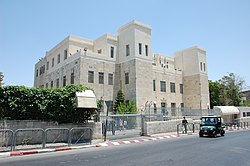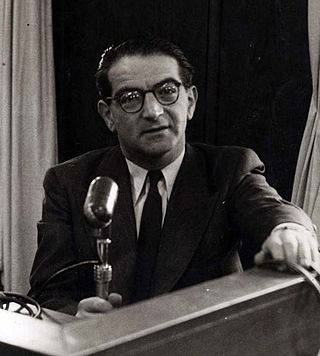
Rezső Kasztner, also known as Rudolf Israel Kastner, was a Hungarian-Israeli journalist and lawyer who became known for having helped a group of Jews escape from occupied Europe during the Holocaust on the Kastner train. After World War II, he was accused of having failed to inform the majority of Hungarian Jews about the reality of what awaited them in Auschwitz. He was assassinated in 1957 after an Israeli court accused him of having "sold his soul to the devil," a charge that was overturned by the Supreme Court of Israel in 1958.

The Kastner train is the name usually given to a rescue operation which saved the lives of over 1,600 Jews from Hungary during World War II. It consisted of 35 cattle wagons that left Budapest on 30 June 1944, during the German occupation of Hungary, ultimately arriving safely in Switzerland after a large ransom was paid to the Nazis. The train was named after Rudolf Kastner, a Hungarian-Jewish lawyer and journalist, who was a founding member of the Budapest Aid and Rescue Committee, a group that smuggled Jews out of occupied Europe during the Holocaust. Kastner negotiated with Adolf Eichmann, the German SS officer in charge of deporting Hungary's Jews to Auschwitz in German-occupied Poland, to allow over 1,600 Jews to escape in exchange for gold, diamonds, and cash. The deal was controversial and has been the subject of much debate and criticism, with some accusing Kastner of collaborating with the Nazis, while others argue that he made difficult choices to save lives.

Siegfried Seidl was an Austrian career officer and World War II commandant of the Theresienstadt concentration camp located in the present-day Czech Republic. He was also the commandant of the Bergen-Belsen, and later served as a staff officer to Adolf Eichmann. After the war, Seidl was tried in Austria and convicted as a war criminal, sentenced to death, and executed by hanging.
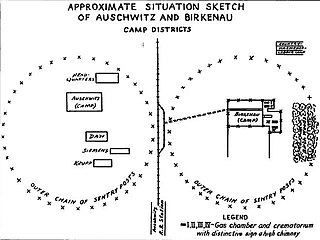
The Vrba–Wetzler report is one of three documents that comprise what is known as the Auschwitz Protocols, otherwise known as the Auschwitz Report or the Auschwitz notebook. It is a 33-page eye-witness account of the Auschwitz concentration camp in German-occupied Poland during the Holocaust.

Rudolf Vrba was a Slovak-Jewish biochemist who, as a teenager in 1942, was deported to the Auschwitz concentration camp in German-occupied Poland. He escaped from the camp in April 1944, at the height of the Holocaust, and co-wrote the Vrba-Wetzler report, a detailed report about the mass murder taking place there. The report, distributed by George Mantello in Switzerland, is credited with having halted the mass deportation of Hungary's Jews to Auschwitz in July 1944, saving more than 200,000 lives. After the war, Vrba trained as a biochemist, working mostly in England and Canada.
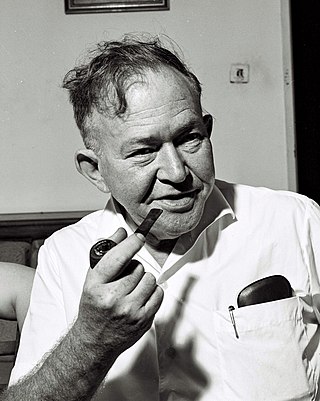
Joel Brand was a member of the Budapest Aid and Rescue Committee, an underground Zionist group in Budapest, Hungary, that smuggled Jews out of German-occupied Europe to the relative safety of Hungary, during the Holocaust. When Germany invaded Hungary in March 1944, Brand became known for his efforts to save the Jewish community from deportation to the Auschwitz concentration camp in occupied Poland and the gas chambers there.

Kurt Andreas Ernst Becher was a mid-ranking SS commander who was Commissar of all German concentration camps, and Chief of the Economic Department of the SS Command in Hungary during the German occupation in 1944. He is best known for having traded Jewish lives for money during the Holocaust.

The Aid and Rescue Committee, or Va'adat Ha-Ezrah ve-ha-Hatzalah be-Budapesht was a small committee of Zionists in Budapest, Hungary, in 1944–1945, who helped Hungarian Jews escape the Holocaust during the German occupation of that country. The Committee was also known as the Rescue and Relief Committee, and the Budapest Rescue Committee.

Malchiel Gruenwald (1882–1968) was an Israeli hotelier, amateur journalist, and stamp collector, who came to public attention in 1953, when he accused an Israeli government employee, Rudolf Kastner, of having collaborated with the Nazis during the Holocaust.

Rabbi Yonasan Steif was a senior dayan of Budapest, Hungary, before the Second World War, a man whom Rabbis Moshe Feinstein and Joel Teitelbaum referred to as the gadol hador. He was a posek and halachic authority.
Perdition is a 1987 stage play by Jim Allen. Its premiere at London's Royal Court Theatre Upstairs, in a production directed by Ken Loach, was abandoned because of protests, and criticism by two historians, over its controversial and tendentious claims.

Benjamin Halevy was an Israeli judge and politician.

Otto Adolf Eichmann was a German-Austrian official of the Nazi Party, an officer of the Schutzstaffel (SS), and one of the major organisers of the Holocaust. He participated in the January 1942 Wannsee Conference, at which the implementation of the genocidal Final Solution to the Jewish Question was planned. Following this, he was tasked by SS-Obergruppenführer Reinhard Heydrich with facilitating and managing the logistics involved in the mass deportation of millions of Jews to Nazi ghettos and Nazi extermination camps across German-occupied Europe. He was captured and detained by the Allies in 1945, but escaped and eventually settled in Argentina. In May 1960, he was tracked down and apprehended by Israel's Mossad intelligence agency, and put on trial before the Supreme Court of Israel. The highly publicised Eichmann trial resulted in his conviction in Jerusalem, following which he was executed by hanging in 1962.

The Eichmann trial was the 1961 trial in Israel of major Holocaust perpetrator Adolf Eichmann who was kidnapped in Argentina by Israeli agents and brought to Israel to stand trial. Eichmann was a senior Nazi party member and served at the rank of Obersturmbannführer (Lieutenant-Colonel) in the SS, and was one of the people primarily responsible for the implementation of the Final Solution. He was responsible for the Nazis' train shipments from across Europe to the concentration camps, even managing the shipment to Hungary directly, where 564,000 Jews died. After World War II he fled to Argentina, living under the pseudonym "Ricardo Clement" until his capture in 1960 by Mossad.

Yehiel De-Nur, also known by his pen name Ka-Tsetnik 135633, born Yehiel Feiner, was a Jewish writer and Holocaust survivor, whose books were inspired by his time as a prisoner in the Auschwitz concentration camp.
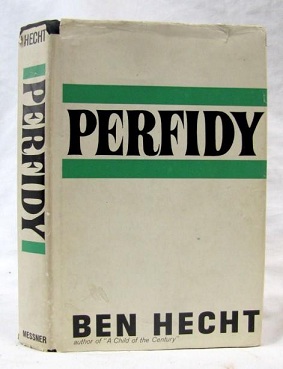
Perfidy is a book written by Ben Hecht in 1961. The book describes the events surrounding the 1954–1955 Kastner trial in Jerusalem.

Hajnalka "Hansi" Brand was a Hungarian-born Zionist activist who was involved, as a member of the Budapest Aid and Rescue Committee, in efforts to rescue Jews during the Holocaust.

The Holocaust in Hungary was the dispossession, deportation, and systematic murder of more than half of the Hungarian Jews, primarily after the German occupation of Hungary in March 1944. Before that, several incidents took place, including The Raid in 1942, the murders of the majority of Jews in Novi Sad and south-eastern Bačka.
Pinchas Freudiger, also Fülöp Freudiger, Philip von Freudiger was a Hungarian-Israeli manufacturer and Jewish community leader.

The Nazis and Nazi Collaborators (Punishment) Law is a 1950 Israeli law passed by the First Knesset that provides a legal framework for the prosecution of crimes against Jews and other persecuted people committed in Nazi Germany, German-occupied Europe, or territory under the control of another Axis power between 1933 and 1945.
